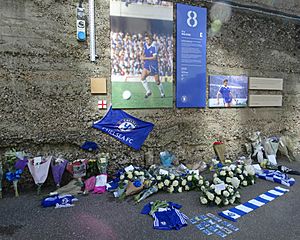Ray Wilkins facts for kids

Wilkins in 2008
|
|||
| Personal information | |||
|---|---|---|---|
| Full name | Raymond Colin Wilkins | ||
| Date of birth | 14 September 1956 | ||
| Place of birth | Hillingdon, England | ||
| Date of death | 4 April 2018 (aged 61) | ||
| Place of death | St George's Hospital, Tooting, England | ||
| Height | 5 ft 8 in (1.73 m) | ||
| Position(s) | Midfielder | ||
| Youth career | |||
| Chelsea | |||
| Senior career* | |||
| Years | Team | Apps | (Gls) |
| 1973–1979 | Chelsea | 179 | (30) |
| 1979–1984 | Manchester United | 160 | (7) |
| 1984–1987 | A.C. Milan | 73 | (2) |
| 1987 | Paris Saint-Germain | 13 | (0) |
| 1987–1989 | Rangers | 70 | (2) |
| 1989–1994 | Queens Park Rangers | 154 | (7) |
| 1994 | Crystal Palace | 1 | (0) |
| 1994–1996 | Queens Park Rangers | 21 | (0) |
| 1996 | Wycombe Wanderers | 1 | (0) |
| 1996–1997 | Hibernian | 16 | (0) |
| 1997 | Millwall | 3 | (0) |
| 1997 | Leyton Orient | 3 | (0) |
| Total | 694 | (48) | |
| International career | |||
| 1976 | England U21 | 1 | (0) |
| 1976–1986 | England | 84 | (3) |
| Managerial career | |||
| 1994–1996 | Queens Park Rangers | ||
| 1997–1998 | Fulham | ||
| 1998–2000 | Chelsea (assistant) | ||
| 2000–2002 | Watford (assistant) | ||
| 2003–2005 | Millwall (assistant) | ||
| 2004–2007 | England U21 (assistant) | ||
| 2008–2009 | Chelsea (assistant) | ||
| 2009 | Chelsea (caretaker) | ||
| 2009–2010 | Chelsea (assistant) | ||
| 2013–2014 | Fulham (assistant) | ||
| 2014–2015 | Jordan | ||
| 2015 | Aston Villa (assistant) | ||
| *Club domestic league appearances and goals | |||
Raymond Colin Wilkins, MBE (born September 14, 1956 – died April 4, 2018) was a famous English football player and coach.
Ray came from a family of footballers. His father and three brothers also played the game. Ray played as a midfielder, known for his smart passes. He started his career at Chelsea. He became captain there when he was just 18 years old.
Later, he played for other big clubs. These included Manchester United, A.C. Milan, and Rangers. He played 84 games for the England national football team. He represented England in major tournaments like UEFA Euro 1980 and the 1982 and 1986 FIFA World Cups.
After his playing days, Ray worked as a TV expert. He also coached and managed teams. He coached Jordan at the 2015 AFC Asian Cup. His last coaching job was as an assistant manager for Aston Villa.
Contents
Playing Career Highlights
Starting at Chelsea
Ray Wilkins was born in Hillingdon, Middlesex. He began his football journey with a Sunday League team called Senrab.
He became well-known in the 1970s at his childhood club, Chelsea. Ray joined Chelsea as an apprentice. He made his first team debut at 17 years old. This was on October 26, 1973, against Norwich City.
In 1975, Chelsea was relegated to a lower league. Many experienced players left the club. An 18-year-old Ray was then made captain by the new manager, Eddie McCreadie. He took over from John Hollins, a long-time Chelsea captain. Ray did very well in this role and kept it for four years.
He became Chelsea's most important player during this time. He led a team of mostly young players. They won promotion back to the top league in 1976–1977. The next season, they stayed in the First Division. Ray's quick success made him very popular. He even appeared in British teen magazines. His older brother, Graham Wilkins, also played for Chelsea.
Moving to Manchester United
In 1979, Chelsea was relegated again. Ray Wilkins then joined Manchester United. The transfer fee was £825,000. This was the highest fee Chelsea had ever received for a player at that time.
He scored ten goals during his five years with Manchester United. One famous goal was a long-range shot. It came in a 2–2 draw against Brighton & Hove Albion. This was during the 1983 FA Cup Final. Manchester United won the replay match.
Fans voted him as the team's player of the year in 1984. His strong performances in midfield caught the eye of A.C. Milan. They offered Manchester United £1.5 million for him.
Playing in Italy and Scotland
Ray Wilkins signed with A.C. Milan in Italy in 1984. He said that getting fit for the Italian game was the hardest part. Coaches made him work hard to reduce his body fat. Ray felt he was in the best shape of his career.
A.C. Milan was having a tough time then. They had been relegated in the 1981–82 Serie A season. Ray was joined by another English player, Mark Hateley. They were the only foreign players on the team. They helped the team beat rivals Inter Milan in the Milan Derby. Italian newspapers and fans praised them.
In his first year, Ray played 28 Serie A games. The team finished fifth in the league. He also helped them reach the Coppa Italia final. He played 105 games for Milan between 1984 and 1987. An Italian newspaper praised him as a "serious and careful professional." They noted he was liked for his "long and precise passes."
Wilkins then joined Paris Saint-Germain in France in 1987. But he did not play much there. So, he quickly moved to Scotland. He signed for Rangers for £250,000 in November 1987.
He played his first game for Rangers on November 28, 1987. It was a 3–2 win against Hearts. He became a key player for the team. The next season, he made a big impact. On August 27, 1988, Rangers played their rivals, Celtic. Ray scored a powerful shot from outside the penalty box. This put Rangers ahead in a 5–1 victory. Rangers went on to win the league title that season. This was the first of their nine titles in a row.
Ray also helped Rangers win the 1988 Scottish League Cup Final. He was an important player until December 1989. His family wanted to return to London. So, he left Rangers to join Queens Park Rangers. When he left, 40,000 fans gave him a standing ovation. Even though he only played two seasons, he was later added to the Rangers Hall of Fame.
Later Career and Retirement
Ray's longest time playing later in his career was at Queens Park Rangers. He was a regular player from November 1989 to 1994. This included the team's first two seasons in the Premier League. He left QPR in 1994 to join Crystal Palace as a player-coach. However, he broke his left foot in his first game and only played once.
Ray returned to QPR as a player-manager on November 15, 1994. The team finished eighth in the Premiership that season. But the next season, the team struggled. They were relegated from the Premier League. Ray played 21 more games for the club as player-manager. He left QPR in September 1996.
In the 1996–1997 season, Ray played for four different clubs. He played one game for Wycombe Wanderers. Then he moved to Hibernian for 16 games. Towards the end of the season, he played three times for Millwall. Finally, he played three games for Leyton Orient before retiring.
International Football for England
Ray Wilkins scored three goals in 84 games for England. He was captain of the team ten times. He played in the 1982 and 1986 World Cups.
He was first called up to play for England in 1976. He made his debut on May 28, 1976, against Italy in New York.
One of his best career moments was helping England qualify for the 1980 European Championships. This was the first major tournament England had reached in ten years. During a game against Belgium, Ray scored a memorable goal. He chipped the ball over the Belgian defenders and then over the goalkeeper into the net.
Ray was a regular player for England during the qualifiers for the 1982 World Cup in Spain. England was knocked out in the second group stage. He continued to play for England under coach Bobby Robson.
Ray was chosen for the squad that qualified for the 1986 World Cup in Mexico. He played in the first game against Portugal. In a later game against Morocco, Ray became the first English player to be sent off at a World Cup. He threw the ball at the referee in protest. He was suspended for the next two games. England lost 2–1 to Argentina in the quarter-final.
Ray played his 84th and final game for England in November 1986. This was against Yugoslavia.
Coaching and Management Career
Early Coaching Roles
Ray Wilkins managed Queens Park Rangers from 1994 to 1996. He also managed Fulham from 1997 to 1998. In March 1999, Ray became Chelsea's first-team coach. He and Graham Rix were temporary managers for Chelsea in 2000. But they were both let go by the new manager, Claudio Ranieri.
When Gianluca Vialli became manager of Watford, Ray assisted him. They both left in June 2002. From 2003 to 2005, Ray helped Dennis Wise manage Millwall. He left when Dave Bassett was hired for the coaching staff.
England Under-21s and Chelsea Return
From 2004, Ray was an assistant coach for the England under-21s. He worked with head coach Peter Taylor. He left when Stuart Pearce took over in 2007.
In September 2008, Ray returned to Chelsea. He was appointed assistant first team coach to Luiz Felipe Scolari. In February 2009, Scolari was sacked. Ray became Chelsea's temporary manager for an FA Cup game against Watford. Chelsea won 3–1. The new manager, Guus Hiddink, watched from the stands.
On November 11, 2010, Chelsea announced Ray's contract would not be renewed. He left the club right away. On December 1, 2010, Ray said he had reached a "harmonious conclusion" with Chelsea. He later said Chelsea never gave him a reason for his sacking.
Chelsea manager Carlo Ancelotti wrote about Ray in his book. He said: "Ray is one of those special people. He is always there, kind-hearted, a true blue-blood. Chelsea runs in his veins. Without him, we would not have won anything."
Later Coaching Roles
On December 30, 2013, Ray became assistant head coach of Fulham. He and Alan Curbishley were sacked on February 17, 2014. The season ended with Fulham being relegated.
On September 3, 2014, Ray was named the new head coach of Jordan. He led Jordan at the 2015 AFC Asian Cup. They were eliminated in the group stage after two losses and one win.
On June 25, 2015, Aston Villa manager Tim Sherwood appointed Ray as his assistant. On October 26, 2015, Ray was sacked along with Tim Sherwood.
Media Work
In the 1990s, Ray was part of the team for the Football Italia show. This show aired on Channel 4. Later, Ray worked as a commentator for Sky Sports. He often covered Champions League games. He also worked for Talksport. Ray was also a commentator in the 1990s Tango soft drink commercials.
Personal Life

Ray was the son of professional footballer George Wilkins. He had two sisters and three brothers who were also footballers. These included Graham Wilkins, Dean Wilkins, and Stephen Wilkins. Throughout his life, Ray was known by his childhood nickname, "Butch."
Ray married Jackie (née Bygraves) in 1978. They had a son and a daughter. He supported the charity Cardiac Risk in the Young. In 1993, he was made an MBE.
Death and Tributes
On March 28, 2018, Ray Wilkins had a cardiac arrest. This caused him to fall. He was put into an induced coma at St George's Hospital in Tooting. He passed away at 61 years old on April 4, 2018.
Hours after his death, Milan played rivals Inter Milan. Ray's former captain, Franco Baresi, placed flowers next to Ray's shirt by the pitch. Milan fans held up a banner that read "Ciao Ray: Leggenda Rossonera" (Goodbye Ray: Legend of the Red and Blacks).
During Chelsea's home game against West Ham United on April 8, fans gave a minute of applause. This happened in the eighth minute to honor Ray. They also held a banner. It read: "Ray was one of those special people, he knew what it meant to be one of us a real blue blood. Chelsea flowed through his veins, may you rest in peace Ray."
A memorial service for Ray was held on May 1. Many football figures attended. On May 19, his wife Jackie was a special guest at the FA Cup final. It was between Chelsea and Manchester United, two of Ray's former clubs. Chelsea won the match 1–0. Jackie presented the trophy to the winning captain, Gary Cahill.
Honours and Awards
As a Player
- Manchester United
- FA Cup: 1982–83
- FA Charity Shield: 1983
- Rangers
- Scottish Premier Division: 1988–89, 1989–90
- Scottish League Cup: 1988–89
- England
- Rous Cup: 1986
- British Home Championship: 1977–78, 1981–82, 1982–83
- Individual Awards
- Chelsea Player of the Year: 1976, 1977
- English Football Hall of Fame: 2013
As Assistant Manager
- Chelsea
- Premier League: 2009–10
- FA Cup: 1999–2000, 2008–09, 2009–10
- FA Community Shield: 2009
See also
 In Spanish: Ray Wilkins para niños
In Spanish: Ray Wilkins para niños


